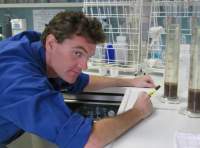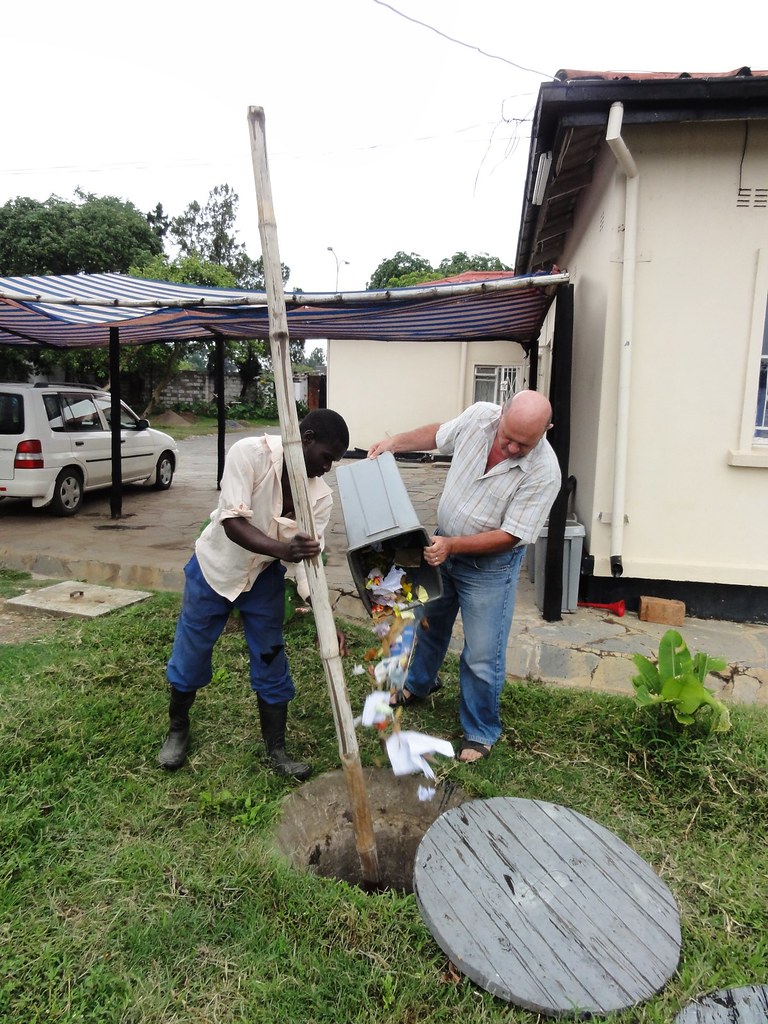- Forum
- categories
- Sanitation systems
- Treatment of wastewater, sludges, organic waste, excreta
- Anaerobic treatment systems (biogas sanitation)
- Biogas sanitation (systems focusing on biogas production)
- Lessons Learned from the Dissemination of Biodigesters for Sanitation in Haiti, from 2010 to 2013
Lessons Learned from the Dissemination of Biodigesters for Sanitation in Haiti, from 2010 to 2013
24.1k views
Re: Lessons Learned from the Dissemination of Biodigesters for Sanitation in Haiti, from 2010 to 2013
thank you for sharing the reports with us!
I just uploaded them to the SuSanA library here (English version) and here (French version) .
Best regards,
Lasse, on behalf of the SuSanA secretariat
Located at Deutsche Gesellschaft für Internationale Zusammenarbeit (GIZ) GmbH, Bonn, Germany
Follow us on facebook: www.facebook.com/susana.org, linkedin: www.linkedin.com/company/sustainable-sanitation-alliance-susana.
Please Log in to join the conversation.
You need to login to reply- Anthony
-
 Topic Author
Topic Author- I am an Independent Consultant with an interest in all things sanitation related, which includes water supply of course.
Less- Posts: 18
- Karma: 2
- Likes received: 11
Re: Lessons Learned from the Dissemination of Biodigesters for Sanitation in Haiti, from 2010 to 2013
Thanks for stimulating the discussion on this thread; its motivating.
We are currently optimizing 10 school biodigesters, the work is very challenging from both a hardware and a software perspective. However, there is incredibly humbling commitment from some of the school committees in order to harvest animal dung for the biodigesters, and there is a great willingness to overcome some of the challenges.
I look forward to sharing more results later on in the year.
Here are the links again. (Elisabeth, feel free to upload them to the SuSanA library)
Full report and appendices in English:
www.dropbox.com/s/jqe3kgzeml3rxap/EN_Biogas%20report.pdf?dl=0
Resume in French:
www.dropbox.com/s/q14ax2ewuvj1bxq/FR_Res...rt%20Biogaz.pdf?dl=0
Best Regards from Haiti,
Anthony.
Please Log in to join the conversation.
You need to login to reply- Elisabeth
-
- User is blocked
- Freelance consultant since 2012
Less- Posts: 3372
- Karma: 54
- Likes received: 932
Re: Lessons Learned from the Dissemination of Biodigesters for Sanitation in Haiti, from 2010 to 2013
Welcome to the Forum and to SuSanA! What brought you to the SuSanA meeting in Dakar?
The SuSanA library is here:
www.susana.org/library
but you can also get to it when you click at the top of this page on the green "SuSanA website" and then on "Resources" under the drop down menu.
If you are new, then you should also check out the "guide for newcomers" see that blue box at the very top left of the page.
Browsing the help section might also be useful (see the question mark at the top right).
If anything is unclear or difficult to find, don't hesitate to put a question in the help section of the forum:
forum.susana.org/forum/categories/132-forum-help-section
As soon as I get hold of Anthony's biogas Haiti report, I will make sure it gets put in the library. I have also e-mailed him about it in case he missed the notifications from this thread.
Greetings,
Elisabeth
Freelance consultant on environmental and climate projects
Please Log in to join the conversation.
You need to login to reply- ekellogg
-

- I and my firm are interested in growing sustainable businesses that supply toilets to Africans of all income levels, especially those of low income.
Less- Posts: 8
- Karma: 1
- Likes received: 1
Re: Lessons Learned from the Dissemination of Biodigesters for Sanitation in Haiti, from 2010 to 2013
One final favor -- could you please tell me how to get to the SuSanA library? I have never accessed it.
Gratefully,
Edwin Kellogg, PhD
Kellogg & Co
Partner, Kellogg Consultants, LLC
Boston, Massachusetts
Please Log in to join the conversation.
You need to login to reply- Elisabeth
-
- User is blocked
- Freelance consultant since 2012
Less- Posts: 3372
- Karma: 54
- Likes received: 932
Re: Lessons Learned from the Dissemination of Biodigesters for Sanitation in Haiti, from 2010 to 2013
Freelance consultant on environmental and climate projects
Please Log in to join the conversation.
You need to login to reply- ekellogg
-

- I and my firm are interested in growing sustainable businesses that supply toilets to Africans of all income levels, especially those of low income.
Less- Posts: 8
- Karma: 1
- Likes received: 1
Re: Lessons Learned from the Dissemination of Biodigesters for Sanitation in Haiti, from 2010 to 2013
Partner, Kellogg Consultants, LLC
Boston, Massachusetts
Please Log in to join the conversation.
You need to login to reply- Elisabeth
-
- User is blocked
- Freelance consultant since 2012
Less- Posts: 3372
- Karma: 54
- Likes received: 932
Re: Lessons Learned from the Dissemination of Biodigesters for Sanitation in Haiti, from 2010 to 2013
A warm welcome to you on the forum!
For those of you wo don't know Christopher yet, here is a photo of him that I quickly found on our flickr photo database, from when he was still working for BORDA in Zambia (are you still with BORDA now, Christopher?):

(Christopher is the white guy in this photo)
It would be nice to have your inputs directly here on the forum (rather than only by bilateral e-mail), I am sure you have lots to share and inputs to give on the various biogas discussions we've had so far.
This is the sub-category about DEWATS and biogas:
forum.susana.org/forum/categories/35-bio...n-systems-and-dewats
And this is the sub-category focussing on biogas production maximisation:
forum.susana.org/forum/categories/171-fo...ng-biogas-sanitation
Maybe you want to jump into any of the previous discussions we have had so far about biogas sanitation, e.g. in Kenya and other countries.
You could start with a new thread where you tell us more about biogas sanitation in Tanzania, is it popular there? Is it used for a combination of farm waste and human excreta like Pawan explained for India above in this thread?
Regards,
Elisabeth
Freelance consultant on environmental and climate projects
Please Log in to join the conversation.
You need to login to reply- CKK
-
- User
- Biogas technology in warm countries since 1983
Less- Likes received: 0
Re: Lessons Learned from the Dissemination of Biodigesters for Sanitation in Haiti, from 2010 to 2013
Thanks for your contribution and for remembering our good discussion in Vietnam.
Please contact me on This email address is being protected from spambots. You need JavaScript enabled to view it. if you wold like to know details referring to my biogas experience in developing countries.
Looking forward
Regards from Arusha, Tanzania
Christopher,
Thanks, Elisabeth to encourage me to become active here in this forum.
Consultant on
Biogas Technology and Sanitation
Christopher Kellner has worked during the last 38 years mainly in Africa on different posts engaged in the dissemination of alternative forms of renewable energy and sanitation. The special interest and experience are in biogas technology. He contributed to the development of the CAMARTEC Biogas Unit Design in Tanzania and has adapted and fine-tuned the technology to the African context in Ethiopia, Lesotho, Zambia, and Tanzania.
Work slogans:
• Start with yourself
• What one man can do another man can do
• Simple things are not simple
• Benefits from sanitation: B & B (Biogas and Banana)
• Learn from nature (How did the apple get on the tree?)
Recent Project Examples
• Biogas from placentas for hospitals (4 implemented)
• DEWATS (Decentralized Wastewater Treatment Systems) for low cost and peri-urban areas and Institutions
• Fecal sludge management in peri-urban areas (Groundwater protection)
Please Log in to join the conversation.
You need to login to replyRe: Lessons Learned from the Dissemination of Biodigesters for Sanitation in Haiti, from 2010 to 2013
Thanks for the information. I have gone through your presentation at FSM 3 and other posts.
Rate of biogas production from human wastes is, on an average, one cubic foot ( 0.03 cum) per person per day. That is, from a family having 5 members using a toilet, only 5 cft biogas will produce per day. One cooking burner consumes 17-18 cft of biogas per hour. Therefore, produced biogas is not enough to meet the requirement of cooking daily. One can use biogas for cooking purpose maximum 6-7 days a month, when biogas plant is fed only with human excreta. Therefore . it is not economically sustainable.
Your photographs of biogas plant in slides appear to be too large size. However, its capacity or size or number of users of toilets are not mentioned. Unnecessary larger size of biogas plant makes it further uneconomical.
Toilet linked biogas plant should be based on mixed feed. Animal waste and / kitchen wastes should be mixed to get higher biogas production. Based on my experimental observation, there is additive effect on biogas production, when human excreta is mixed with animal dung or kitchen waste in the digester.
A few hundreds of toilet linked biogas plants in one district in India have been installed last year. Utilisation rate of biogas by families is 100%. No any family is using LPG or any other fuel for cooking except biogas. All the biogas plants are based on mixed feed- human excreta with animal dung.Only 17-18 kg of animal dung is required to produce enough biogas to meet the cooking requirement of a family. You can find detail of the biogas and its utilisation in the book - Technological options for solid and liquid waste management, in the last chapter. Linke of the book is--http://mdws.gov.in/sites/upload_files/ddws/files/pdfs/Solid_and_Liquid_Waste_%28E%29.pdf
Regards
Pawan
Chairman
Foundation for Environment and Sanitation
Mahavir Enclave
New Delhi 110045, India
Web: www.foundation4es.org
Linked: linkedin.com/in/drpkjha
Please Log in to join the conversation.
You need to login to reply- Elisabeth
-
- User is blocked
- Freelance consultant since 2012
Less- Posts: 3372
- Karma: 54
- Likes received: 932
Re: Lessons Learned from the Dissemination of Biodigesters for Sanitation in Haiti, from 2010 to 2013
Or jump to time: 22m20s in this video:
The question and answer session starts here:
I recommend checking out the question and answer session. Anthony got one question/comment by Doulaye Kone (Gates Foundation) and one question/comment by Christopher Kellner. Very interesting stuff about biogas in general and how to make it work in a country in particular.
Regards,
Elisabeth
Freelance consultant on environmental and climate projects
Please Log in to join the conversation.
You need to login to reply- Anthony
-
 Topic Author
Topic Author- I am an Independent Consultant with an interest in all things sanitation related, which includes water supply of course.
Less- Posts: 18
- Karma: 2
- Likes received: 11
Re: Lessons Learned from the Dissemination of Biodigesters for Sanitation in Haiti, from 2010 to 2013
Thanks for your comments and for posting the FSM3 presentation.
Indeed you would be very welcome to upload the document to the SuSanA library.
I did get some good feedback during FSM3:
• I took the opportunity during my presentation to ask the assembled room of experts whether they thought a biodigester as a stand alone process unit was an effective waste treatment technology? I was happy to see that not a single person raised their hands. A simple literature review will confirm this, and also suggest that a biodigester is used only in conjunction with other downstream units; usually and ABR and then a PGF. However, this important qualification was overlooked during the Haitian experience, and has been overlooked in other contexts too.
• I also asked the experts whether they thought a biodigester produced a "useful" quantity of biogas if only using human waste? In this case about half of the room raised their hands. If we can, for a moment, overlook the obvious answer of "it depends", and also the question "what does a "useful" quantity of biogas actually mean"?, then this anecdotal straw poll suggested to me that within the FSM sector, there are those who believe in harvesting the energy potential from human waste, and those who are more skeptical.
• After my presentation, I heard from some rather vocal advocates of biodigesters, who did not agree with my cautious "Don't sex up the technology" recommendation, and held the firm belief that biodigesters were actually rather sexy, and should be marketed as such. I suppose we all have good and bad experiences of one technology or another, which forms our opinions over time.
• Finally, I was happy to meet Christopher Kellner of BORDA-TED who recounted other examples where biodigester dissemination programmes had not been all that they had hoped to be - Tanzania; Nepal?; (perhaps Afghanistan?).... I would love to hear more about these programmes if Christopher or his colleagues are reading this.
I agree with you Elisabeth in that I would like to see more Lessons Learned documents produced. After all, we learn the most from our mistakes do we not? And with all the billions of dollars spent on sanitation interventions around the world, and with all the billions of people who remain without sustainable sanitation, surely there are many opportunities to capitalise on lessons learned, and avoid the duplication of mistakes.
For those who are interested to hear more on the unfolding Haitian biogas saga, we are optimizing a few of the 99 biodigesters which were built; those which are accepted and well managed, so as to maximise the potential benefits. There will be more in depth research into these biodigesters, and a research document will follow in due course. We'll keep you posted.
Best Regards,
Anthony.
Please Log in to join the conversation.
You need to login to reply- Elisabeth
-
- User is blocked
- Freelance consultant since 2012
Less- Posts: 3372
- Karma: 54
- Likes received: 932
Re: Lessons Learned from the Dissemination of Biodigesters for Sanitation in Haiti, from 2010 to 2013
Thanks for making this document available, can we also upload it in the SuSanA library?
I really do like "lessons learned" type documents, especially when they are not afraid to talk about failures and things that didn't work.
In your executive summary it said - which I think is relevant for many people working on biogas sanitation:
The report shows that over the 4 year period, most of
the biodigesters did not deliver on all of their objectives
of sanitation, biogas and biol, although the majority of
toilets connected to the biodigesters were evaluated as
‘functional’. There were isolated examples of success
in all 3 objectives, for example in markets and in dense
urban areas where users paid to use to toilets and the
Operating Agencies acted diligently in the execution of
their management tasks.
The report’s discussion and conclusions explain the
complexities of biodigester implementation, and state
the lessons learned. The report’s recommendations focus
very strongly on the need for more specific research
in Haiti, and the importance of implementing biodigesters
for sanitation of human waste only as modules in a
DEWATS approach, rather than as stand alone units. Finally
the recommendations highlight the need to always
commence with a strong implication of the Operating
Agency when implementing DEWATS projects.
Here is also the link to Anthony's presentation at the FMS3 conference:
Lessons learned from the dissemination of biodigesters for sanitation in Haiti, from 2010 to 2013: Anthony Benedict Kilbride, Sustainable Sanitation Consultant, Port-au-Prince, Haiti
www.susana.org/images/documents/07-cap-d.../2-3-4-2Kilbride.pdf
Anthony, could you tell us what kind of feedback you got after the presentation, i.e. questions and further discussions with participants?
I copy a couple of findings from your presentation below:
+++++++++++
- Only a few biodigesters (22%) had the means t use the biogas…
- … and even fewer (8%) actually produced any usable biogas.
• Don’t rush the pilot.
• Don’t sex up the technology.
• The management plan is made by them, not for them.
• Implementation requires skilled and experienced professionals.
• Piloting requires research skills.
• No such thing as a ‘free’ toilet.
• Test the biol in a certified laboratory.
• Emergency/Early Recovery contexts - not conducive to dissemination of new FSM technologies.
++++++++++
The photos in your presentation are really interesting and I hope the video from your presentation (and from all the FSM3 presentations) will become available very soon (I know that the work on the videos is going on in the background at maximum speed).
Thank you for not being afraid to share with us something that hasn't worked out so well, I wish more people would do so instead of sweeping those kinds of experiences under the carpet...
Regards,
Elisabeth
Freelance consultant on environmental and climate projects
Please Log in to join the conversation.
You need to login to reply- Forum
- categories
- Sanitation systems
- Treatment of wastewater, sludges, organic waste, excreta
- Anaerobic treatment systems (biogas sanitation)
- Biogas sanitation (systems focusing on biogas production)
- Lessons Learned from the Dissemination of Biodigesters for Sanitation in Haiti, from 2010 to 2013








